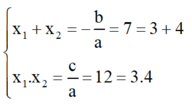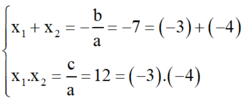x2+7x+12=0
x=
Hãy nhập câu hỏi của bạn vào đây, nếu là tài khoản VIP, bạn sẽ được ưu tiên trả lời.


a) x 2 – 7 x + 12 = 0
Có a = 1; b = -7; c = 12
⇒ Δ = b 2 – 4 a c = ( - 7 ) 2 – 4 . 1 . 12 = 1 > 0
⇒ Phương trình có hai nghiệm phân biệt x 1 ; x 2 thỏa mãn:

Vậy dễ dàng nhận thấy phương trình có hai nghiệm là 3 và 4.
b) x2 + 7x + 12 = 0
Có a = 1; b = 7; c = 12
⇒ Δ = b2 – 4ac = 72 – 4.1.12 = 1 > 0
⇒ Phương trình có hai nghiệm phân biệt x1; x2 thỏa mãn:

Vậy dễ dàng nhận thấy phương trình có hai nghiệm là -3 và -4.

\(\Leftrightarrow\dfrac{1}{\left(x+2\right)\left(x+3\right)}+\dfrac{1}{\left(x+3\right)\left(x+4\right)}+...+\dfrac{1}{\left(x+5\right)\left(x+6\right)}=\dfrac{1}{8}\)
=>\(\dfrac{1}{x+2}-\dfrac{1}{x+3}+\dfrac{1}{x+3}-\dfrac{1}{x+4}+...+\dfrac{1}{x+5}-\dfrac{1}{x+6}=\dfrac{1}{8}\)
=>1/x+2-1/x+6=1/8
=>\(\dfrac{x+6-x-2}{\left(x+2\right)\left(x+6\right)}=\dfrac{1}{8}\)
=>x^2+8x+12=32
=>x^2+8x-20=0
=>(x+10)(x-2)=0
=>x=-10 hoặc x=2

a, \(3x^2+4x=2x\Leftrightarrow3x^2+2x=0\Leftrightarrow x\left(3x+2\right)=0\Leftrightarrow x=-\dfrac{2}{3};x=0\)
b, \(25x^2-\dfrac{64}{100}=0\Leftrightarrow25x^2-\left(\dfrac{8}{10}\right)^2=0\Leftrightarrow\left(5x-\dfrac{8}{10}\right)\left(5x+\dfrac{8}{10}\right)=0\)
\(\Leftrightarrow x=\dfrac{4}{25};x=-\dfrac{4}{25}\)
c, \(x^4-16x^2=0\Leftrightarrow x^2\left(x-4\right)\left(x+4\right)=0\Leftrightarrow x=0;x=-4;x=4\)
sửa d, \(x^2+x=6\Leftrightarrow x^2+x-6=0\Leftrightarrow\left(x-2\right)\left(x+3\right)=0\Leftrightarrow x=-3;x=2\)
e, \(x^2-7x=-12\Leftrightarrow x^2-7x+12=0\Leftrightarrow\left(x-4\right)\left(x-3\right)=0\Leftrightarrow x=3;x=4\)
e: ta có: \(x^2-7x=-12\)
\(\Leftrightarrow x^2-7x+12=0\)
\(\Leftrightarrow\left(x-3\right)\left(x-4\right)=0\)
\(\Leftrightarrow\left[{}\begin{matrix}x=3\\x=4\end{matrix}\right.\)

a) \(x^2+5x+4==x\left(x+1\right)+4\left(x+1\right)=\left(x+1\right)\left(x+4\right)\)
b) \(3x^2+4x-7=3x\left(x-1\right)+7\left(x-1\right)=\left(x-1\right)\left(3x+7\right)\)
c) \(x^2+7x+12=x\left(x+3\right)+4\left(x+3\right)=\left(x+3\right)\left(x+4\right)\)

a, 7x - 14
= 7(x-2)
b, 2x - 2y + \(x^2\)- xy
= (2x-2y) + (\(x^2\)-xy)
= 2(x-y) + x(x-y)
= (x-y)(2+x)
c, 6x + 12
= 6(x+2)
\(a,=7\left(x-2\right)\\ b,=2\left(x-y\right)+x\left(x-y\right)=\left(x+2\right)\left(x-y\right)\\ c,=6\left(x+2\right)\\ d,\text{Sai đề}\)

a) \(\left(x^2-7x+12\right).\left(x^2-15x+56\right)-60\)
\(=\left(x-3\right)\left(x-4\right)\left(x-7\right)\left(x-8\right)-60\)
b) \(x^4+2000x^2+1999x+2000\)
\(=\left(x^2-x+2000\right)\left(x^2+x+1\right)\)
\(=\left(x^2+x-1\right)^2+1999\left(x^2+x+1\right)+1\)